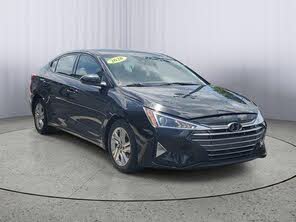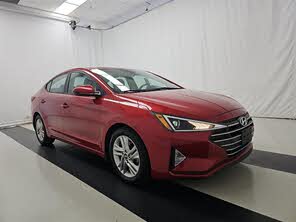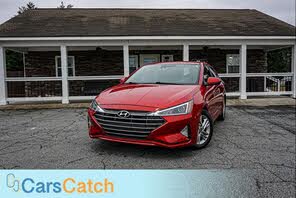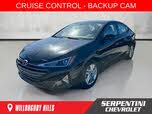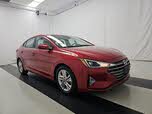2020 Toyota Camry vs 2020 Hyundai Elantra
Overview | |
MSRP$24,425 | MSRP$19,300 |
Listings1360 | Listings992 |
Ratings & Reviews | |
User Reviews | User Reviews |
Expert reviews7.5 out of 10 | Expert reviews8.3 out of 10 |
Pros
Cons
| Pros
Cons
|
2020 Toyota Camry Reviews SummaryIf you can't beat them, join them. That seems to be Toyota's philosophy in updating the eighth generation of the Camry for the 2020 model year. This latest version of the perennial best seller debuted in 2017 as a 2018 model—and promptly lost its sales crown to Toyota's own RAV4 crossover SUV. As buyers continue to defect from cars, Toyota hopes to entice more shoppers to stick with its midsize sedan by offering all-wheel drive on the Camry for the first time since 1991. Also new for 2020 is the Camry TRD, a sportier version with a 301-horsepower V6 engine that makes its case to a buyer who might never have considered a Camry. | |
2020 Hyundai Elantra Reviews SummaryHyundai isn’t pulling any punches when it comes to the compact car segment, where value is of utmost importance. And though a completely redesigned 2021 Elantra is coming soon, the automaker bestows several value-enhancing improvements upon the outgoing 2020 Hyundai Elantra compact sedan. They include free scheduled maintenance, improved fuel economy ratings, and new standard safety features. | |
No video found | No video found |
Popular Features & Specs | |
Engine2.5L 203 hp I4 | Engine2.0L 147 hp I4 |
Drive TrainFWD | Drive TrainFWD |
Seating Capacity5 | Seating Capacity5 |
Horsepower | Horsepower147 hp @ 6200 rpm |
MPG City29 | MPG City31 |
MPG Highway41 | MPG Highway41 |
Engine | |
Engine Name2.5L 203 hp I4 | Engine Name2.0L 147 hp I4 |
Torque | Torque132 lb-ft @ 4500 rpm |
Horsepower | Horsepower147 hp @ 6200 rpm |
DrivetrainFWD | DrivetrainFWD |
Fuel Economy | |
MPG City29 | MPG City31 |
MPG Highway41 | MPG Highway41 |
Interior | |
Seating Capacity5 | Seating Capacity5 |
Safety | |
Front Crash Overall5 | Front Crash Overall4 |
Side Crash Overall5 | Side Crash Overall4 |
Dimensions & Capacity | |
Cargo Space14.1 cu ft | Cargo Space14.4 cu ft |
Curb Weight3241 lbs | Curb Weight2844 lbs |
Height56.9 in | Height56.5 in |
Length192.1 in | Length181.9 in |
Width72.4 in | Width70.9 in |
Wheelbase111.2 in | Wheelbase106.3 in |
Maximum Payload925 lbs | Maximum Payload1080 lbs |
Number of doors4 | Number of doors4 |
Overview | ||
MSRP | $24,425 | $19,300 |
Listings | ||
Ratings & Reviews | ||
User reviews | ||
Expert reviews | 7.5 out of 10Read full review | 8.3 out of 10Read full review |
Pros & cons | Pros
Cons
| Pros
Cons
|
Summary | If you can't beat them, join them. That seems to be Toyota's philosophy in updating the eighth generation of the Camry for the 2020 model year. This latest version of the perennial best seller debuted in 2017 as a 2018 model—and promptly lost its sales crown to Toyota's own RAV4 crossover SUV. As buyers continue to defect from cars, Toyota hopes to entice more shoppers to stick with its midsize sedan by offering all-wheel drive on the Camry for the first time since 1991. Also new for 2020 is the Camry TRD, a sportier version with a 301-horsepower V6 engine that makes its case to a buyer who might never have considered a Camry. | Hyundai isn’t pulling any punches when it comes to the compact car segment, where value is of utmost importance. And though a completely redesigned 2021 Elantra is coming soon, the automaker bestows several value-enhancing improvements upon the outgoing 2020 Hyundai Elantra compact sedan. They include free scheduled maintenance, improved fuel economy ratings, and new standard safety features. |
Video | No video found | No video found |
Popular Features & Specs | ||
Engine | 2.5L 203 hp I4 | 2.0L 147 hp I4 |
Drive Train | FWD | FWD |
Seating Capacity | 5 | 5 |
Horsepower | 147 hp @ 6200 rpm | |
MPG City | 29 | 31 |
MPG Highway | 41 | 41 |
Engine | ||
Engine Name | 2.5L 203 hp I4 | 2.0L 147 hp I4 |
Torque | 132 lb-ft @ 4500 rpm | |
Horsepower | 147 hp @ 6200 rpm | |
Drivetrain | FWD | FWD |
Fuel Economy | ||
MPG City | 29 | 31 |
MPG Highway | 41 | 41 |
Interior | ||
Seating Capacity | 5 | 5 |
Safety | ||
Front Crash Overall | 5 | 4 |
Side Crash Overall | 5 | 4 |
Dimensions & Capacity | ||
Cargo Space | 14.1 cu ft | 14.4 cu ft |
Curb Weight | 3241 lbs | 2844 lbs |
Height | 56.9 in | 56.5 in |
Length | 192.1 in | 181.9 in |
Width | 72.4 in | 70.9 in |
Wheelbase | 111.2 in | 106.3 in |
Maximum Payload | 925 lbs | 1080 lbs |
Number of doors | 4 | 4 |
The 2020 Toyota Camry had a renewed focus on quality and appeal, aiming to reclaim its reputation for reliability and value. The styling was more expressive than ever, with a bold front fascia and taut lines that gave it a sporty look. The interior featured uniformly nice materials and a driver-focused dashboard, making even the base trims feel upscale. The TRD model added red trim accents, including bright red seatbelts, enhancing its sporty appeal. Despite not being a luxury car, the Camry's top trims offered leather and wood finishes that rivaled entry-level Lexus models.
In contrast, the 2020 Hyundai Elantra retained its bold, geometric styling from the previous year's restyle. Available in six trims, the Elantra offered a range of features and prices, from the base SE to the sporty Sport model. The Limited trim, tested here, featured a black paint job that highlighted its angular design elements. Inside, the Elantra aimed for an upscale look with silver trim and leather upholstery, though some hard plastics reminded occupants of its mainstream status. The Elantra's interior updates made it a stylish and comfortable compact car.











The 2020 Toyota Camry offered four distinct powertrains: a 2.5-liter four-cylinder with FWD or AWD, a 3.5-liter V6 with FWD, and a hybrid option. The 3.5-liter V6 produced 301 horsepower and was paired with an eight-speed automatic transmission, making it a smooth and powerful choice for those seeking luxury. The 2.5-liter four-cylinder, with 203 horsepower (206 in XSE trim), provided a lighter and more agile driving experience. The AWD system, similar to that in the RAV4, could send up to half of the engine's 184 lb-ft of torque to the rear wheels, enhancing traction in slippery conditions. Fuel economy varied, with the FWD four-cylinder achieving 31 mpg combined, the AWD version 28 mpg, and the V6 models around 25-26 mpg.
The 2020 Hyundai Elantra featured a base 2.0-liter four-cylinder engine with 147 horsepower, paired with a new CVT. The Eco model had a 1.4-liter turbocharged engine with 128 horsepower and a seven-speed DCT, achieving 36 mpg combined. The Sport trim offered a 1.6-liter turbocharged engine with 201 horsepower and 195 lb-ft of torque, along with an independent rear suspension for improved handling. The new CVT, called the "Intelligent Variable Transmission," aimed to improve efficiency and responsiveness, though real-world testing showed mixed results. The Elantra's ride quality varied, with the Sport trim providing a more enjoyable driving experience.
The 2020 Toyota Camry was easy to drive and featured a well-organized interior. Front legroom and hip room increased from the previous generation, but rear legroom and overall passenger volume decreased slightly. The trunk offered 15.1 cubic feet of cargo space, smaller than some competitors. The addition of AWD did not compromise interior space, thanks to modifications in the floor structure and fuel tank.
The 2020 Hyundai Elantra provided roomy accommodations for four adults, with a fifth person fitting for short trips. The Limited trim included power driver's seat adjustment, leather upholstery, and a sliding center console armrest. All Elantras came with dual-zone automatic climate control, though rear air vents were absent. Interior storage was adequate, and the trunk offered 14.4 cubic feet of space, comparable to some midsize sedans. A thoughtful touch was the interior grab handle inside the trunk lid.
The 2020 Toyota Camry added Android Auto to its standard features, joining Apple CarPlay, Amazon Alexa compatibility, and a three-month trial of SiriusXM satellite radio. The standard infotainment system, though functional, felt dated with low-resolution graphics. The 7-inch touchscreen could be upgraded to 8 inches, and higher trims offered a 10-inch head-up display. A three-month trial of WiFi Connect and a one-year trial of Remote Connect were also available.
The 2020 Hyundai Elantra's standard equipment included a touchscreen infotainment system with Bluetooth and a USB port. The SE trim had a 5-inch screen, while the SEL and higher trims featured a 7-inch display with Apple CarPlay, Android Auto, and SiriusXM. The Limited trim added wireless smartphone charging and a premium Infinity sound system. The Ultimate Package increased the screen size to 8 inches and added navigation and Blue Link services. The infotainment system was user-friendly, with shortcut buttons and voice recognition.
The 2020 Toyota Camry came with Toyota Safety Sense, including a pre-collision system, adaptive cruise control, lane-departure warning, and automatic high beams. A one-year trial of Safety Connect was included, and blind-spot monitoring was optional. The Camry earned a five-star rating from the NHTSA and a Top Safety Pick+ from the IIHS. There was one recall for leaking engine coolant affecting some 2.5-liter models.
The 2020 Hyundai Elantra featured Hyundai Smart Sense, with forward-collision warning, automatic emergency braking, lane departure warning, lane-keeping assist, and a driver attention monitor. Starting with SEL trim, blind-spot warning and rear cross-traffic alert were included. The Limited and Sport trims had full LED headlights with automatic high beams. The Ultimate Package added adaptive cruise control and pedestrian detection. The Elantra earned a Top Safety Pick from the IIHS and a four-star rating from the NHTSA, with a noted concern about rear-door intrusion in side-impact tests.
CarGurus highlights

According to CarGurus experts, the overall rating for the 2020 Toyota Camry is 7.5 out of 10, while the 2020 Hyundai Elantra scores 8.3 out of 10. Based on these ratings, the 2020 Hyundai Elantra is the better choice, offering a more enjoyable driving experience, better technology, and greater value for the price.
Choose the 2020 Toyota Camry if:
- You prioritize a smooth and powerful V6 engine option.
- You want a sedan with a high level of standard safety features and top safety ratings.
- You prefer a car with a more luxurious interior feel, especially in higher trims.
Choose the 2020 Hyundai Elantra if:
- You seek a more affordable compact car with a range of trim options.
- You value user-friendly technology and a well-executed infotainment system.
- You need a car with good fuel economy and a comfortable ride for daily commuting.
CarGurus highlights

According to CarGurus experts, the overall rating for the 2020 Toyota Camry is 7.5 out of 10, while the 2020 Hyundai Elantra scores 8.3 out of 10. Based on these ratings, the 2020 Hyundai Elantra is the better choice, offering a more enjoyable driving experience, better technology, and greater value for the price.
Choose the 2020 Toyota Camry if:
Shop Now- You prioritize a smooth and powerful V6 engine option.
- You want a sedan with a high level of standard safety features and top safety ratings.
- You prefer a car with a more luxurious interior feel, especially in higher trims.
Choose the 2020 Hyundai Elantra if:
Shop Now- You seek a more affordable compact car with a range of trim options.
- You value user-friendly technology and a well-executed infotainment system.
- You need a car with good fuel economy and a comfortable ride for daily commuting.

By: CarGurus + AI
At CarGurus, our team of experienced automotive writers remain at the heart of our content operation, conducting hands-on car tests and writing insightful guides that are backed by years of industry experience. To complement this, we are harnessing AI to make our content offering more diverse and more helpful to shoppers than ever. To achieve this, our AI systems are based exclusively on CarGurus content, ratings and data, so that what we produce is both unique to CarGurus, and uniquely helpful to car shoppers.














